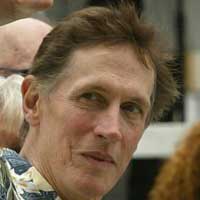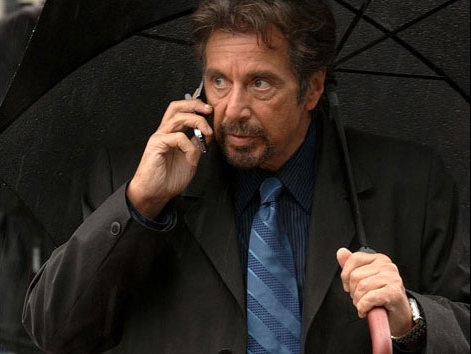Bayside resident Mark Metcalf is an actor who has worked in movies, TV and on the stage. He is best known for his work in "Animal House," "Buffy the Vampire Slayer" and "Seinfeld."
In addition to his work on screen, Metcalf is involved with the Milwaukee International Film Festival, First Stage Children's Theater and a number of other projects, including the comedy Web site, comicwonder.com.
He also finds time to write about movies for OnMilwaukee.com. In this month's installment of the Screening Room, Mark looks at "Mongol" and takes a second look at "The Dark Knight."
MONGOL (2007)
Location can mean a lot to a film. It means almost everything to "Mongol." The vast, rolling plains with the vague outline of snow-capped mountains in the background; a solitary man, or three, on horseback, isolated in that huge panorama. There is enough drama in the landscape to make three movies. And this is just what Sergei Bodrov is planning to do. The Russian director is making a trilogy about the life of Genghis Khan. This is Part One.
It starts when Temudjin (the young Genghis) is nine years old and he is traveling with his father, the Khan, to choose a bride. His father tells him to pick one with strong legs because they make good wives. He does so. And they leave promising to return when he and the girl is old enough to wed. He is gone for a long time and a lot happens during that time.
The chronology of this film is a little hard to track. A graphic tells you every once in a while what year you are in, and during the course of the film a lot of ground is covered, up to the beginning of Genghis Khan's reign over almost half the known world.
The spine of the story of this first film of the trilogy is the love story between Temudjin and Borte, the girl he chose when he was nine. In many ways it's a typical Hollywood love story -- except that they are Mongol and have different customs and beliefs than the typical Hollywood couple.
Temudjin does return for her after maybe nine years, and she has waited for him. They return to his mother's yurt and are married; but an enemy of his father steals her, and they are separated for another couple of years. When he catches up with her and kills his enemy, she is pregnant with the child of the person who captured her. Temudjin easily takes responsibility for this child as though it were his own. Then, he is taken as a slave and they are separated again... and so it goes. They are apart much more than they are together, but because of a deep, mystical faith, and their belief in each other, they never stop trying to be together against impossible odds.
Temudjin has two children that are not his biologically, but he raises them as though they are his own. It is really quite wonderful how the film and the characters treat as important the serious matters of faith and their belief in the love they have for each other, and the more temporal matters of the flesh are treated in a totally pragmatic way.
Because she is a woman who has no money and because she must travel great distances to find and save her husband, she uses her body in the way that men want her to in order to accomplish what is important.
It does not trouble her and it does not trouble him. It was necessary and she did it. There is no neurosis about it. I'm not a real anthropologist but perhaps it's because life in the steppe is so harsh, and the isolation is so great, that things that matter to us, who are so physically comfortable and for whom human contact is so plentiful, things that matter a great deal to us mean very little or nothing to them. And yet, the value of the family, an idea that we have built entire political campaigns around, is a very serious and practical concern for them.
When the film is around three quarters done, it begins to telescope through time, covering great periods of Genghis Khan's history in a single image. There is a huge battle between his army and the army of his blood brother, who has saved his life a few times through the course of their time together. And vice versa. I wish they covered some of the events that led up to that battle, and some of what happens afterwards as Khan rose to rule most of China and began his expansion across the know world.
In many ways the movie could have been made in the United States in the 1950's or ‘60's starring Tony Curtis and Natalie Wood. But it wouldn't have had the visual and textural detail of the culture of the Mongol people. It wouldn't have had the camera work, the tremendous vistas. It would have had movie stars instead of people that seem to have lived on the steppe all their lives. Because it has that authenticity, it has a deeper resonance, a greater value, and something about it's relationship with the belief in destiny, and Khan's intuitive understanding of his own destiny, gives it profound meaning.
I reviewed this when it was in the theaters, but I had a chance to see it again. The first time around, I made the point that Heath Ledger's performance is extraordinary: frighteningly real and deeply psychotic. I've seen the snake-like tongue before in other performances and I would swear he's stolen the vocal inflection and rhythm from a cartoon I've seen somewhere, but the energy and the animal-like concentration, the joy in performing, and the fact that he just moves in, takes over, and holds down the center of the movie make it a rare treat.
I wish Christian Bale had not reconfigured his larynx in order to come up with Batman's voice. It's a bad actor choice and the director should have stepped in and said "No." Bale sounds like he's trying to recreate Michael Keaton's performance in one of the other, cartoon-like Batman movies. A seriously bad choice. It totally neutralizes anything he has to say by removing inflection and the fact that it sounds phony, since they have to amp up the volume in order for it to be heard removes much of the character's credibility.
Bale does an otherwise very good job of getting out of the way of Heath Ledger. It's difficult to be Batman. Ellen Burstyn, a wonderful actress and good teacher that I watched at the Actor's Studio in New York City, said that the actor's job is to create masks for the character to wear and then at precise moments to let that mask slip so that the audience can see behind it and see the true heart of the character.
Batman is difficult because he is all mask. Bruce Wayne is a mask for Batman. And Batman is a mask. The only moments we might get a chance to see the true self are in the eyes of Michael Caine and Morgan Freeman, the two people most loyal to him.
Bale and Christopher Nolan, the director, work fairly hard to edit Bale's performance so that we seldom see him without one of the masks, unless it is in profile, and quickly. He seems to be motivated by his continuing love for and need for love from Rachel, but the only time he comes close to expressing this is with his back to us, as though he were embarrassed by the simplicity of the feeling.
The story is complicated and handles a lot of different layers of guilt and responsibility without ever preaching a specific moral code. In the spectrum of super heroes, Batman is definitely the darkest of the knights, and the one most familiar with corruption of the soul.
They don't spare the rabble, by that I mean we the people and our culture, either. My favorite line is one of the last, as Batman limps away into the darkness; Commissioner Gordon's son turns to him and asks, "Why is he running away?" The answer is simply, "Because, we need to chase him." It's a chicken-and-egg question and the answer here is that we need bogeymen in order to justify our primal urge for violence.
Mark Metcalf is an actor and owner of Libby Montana restaurant in Mequon. Still active in Milwaukee theater, he's best known for his roles as Neidermeyer in "Animal House" and as The Maestro on "Seinfeld."
Originally from New Jersey, Metcalf now lives in Bayside.







